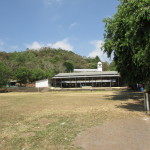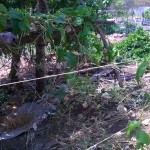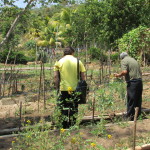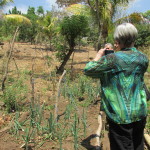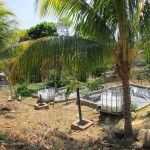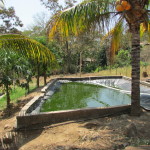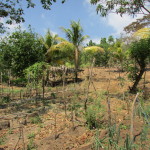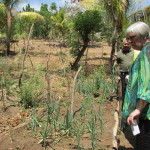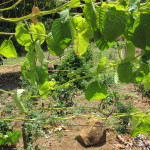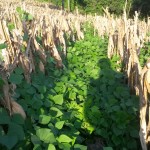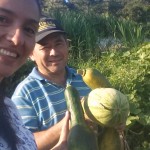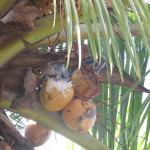For most Americans, if you ask them where their morning grapefruit comes from, they will say “the grocery store”. For so many of us, the chasm between the food that we consume and the knowledge about the “art and science of farming” is enormous. US culture abandoned the family farms a century ago. But, for the 3rd world, there is still more of a bond to the farms since the produce is bought and sold on the streets from family vendors. But, the Americanization of the food industry is conquering Latin America much faster than Cortes and the Spanish did. Today, throughout El Salvador, SuperSelectos (giant grocery stores) are popping up literally on every street corner. Frozen pizzas and sugary cereals are becoming more common in middle class homes. US style prepared foods and restaurants are ubiquitous and many of the traditions and skills are being lost by the younger generations.
But, COAR is working to turn back the clock – a bit. COAR developed a sustainable agriculture program several years ago. This “taller” or extra curricular workshop is open to any high school student. The class meets every Monday, Wednesday and Friday from 330 -500pm. Currently, there are 50 students enrolled in the program. The government was one of the earliest proponents of these workshops because they felt that given the terrible growth of gangs and gang-violence, these workshops would give the students a safe place to spend their time, off of the streets, in purposeful enterprise, entertained by the natural curiosity supplied by hands-on learning. However, social scientists quickly realized that the younger generations are losing contact with their farming past. Through these workshops, students can not only learn about modern techniques for sustainable and environmentally friendly farming, but also, they will hopefully grow to value and appreciate the role of farming in the culture.
As a witness to the development of this program, I can call it a complete success. Just a few years ago, the hillside above COAR’s high school was completely overgrown with brush, vines, small trees and prickly vegetation. The children, working with adult supervision, cleared the land – tree by tree, bush by bush. Then, they tilled the soil and created beds for cultivation. From jungle, grew beds sewn with beans, tomatos, chiles, carrots, greens and different melons. Once the ‘hard work’ of cultivating the land was accomplished, it was time to discuss environmentally-friendly sustainable agriculture. Students learned about ‘green’ fertilizer techniques instead of just dumping chemicals and pesticides.
But, how do you grow vegetables in a land where there is literally no rain from October until May? The answer was simple and affordable: drip irrigation. The kids collected 2-liter pop bottles from the trash, inverted them, attached them to stakes and poked a tiny hole in the cap. Drip by drip, day after day, the soil directly under the bottle remainded moist – giving life to the seedlings and plants. You didnt have to invest in an irrigation system. You didnt have to pour gallons upon gallons of water out of traditional watering cans. One only had to refill a 2 liter bottle a couple of times a week to supply enough moisture to support plant life. Of course, you also planned your sewing and harvesting around the optimum weather pattern. But, while the rainy season brings all vegetation to life – it is drip irrigation which allows the plants to survive until the rainy season fosters gigantic growth.
The next step for COAR’s students was to create a Tilapia pond so that they could raise fish for food. If you have ever visited a hilly or mountainous region, you know that with some creativity and science, farmers can develop land for farming that almost seems vertical. But, here on the hills above COAR, we have built several tilapia ponds. The kids raise the fish from tiny babies until they are full grown fish – ready to be eaten. Whether it is fish or beans, fruits or vegetables, the COAR sustainable agriculture kids harvest the items for use in the cafeteria. If the harvest is so bountiful that there is more food than can be used at one time, the school can actually sell the extras to local vendors on the streets around the town. Nothing is wasted and if the kids are lucky, they can actually generate a profit which pays for the purchase of next year’s seeds.
In a time when even in El Salvador, delivery pizza (or Pollo Campero chicken) is just a phone call away, it is exciting to see a school invest in sustainable agriculture not only as a way to teach about ‘green farming’ but also to reinforce the value of farming within in the culture. When the kids eat a traditional Salvadoran 3 leches cake – topped with strawberries and fruit – maybe they will better appreciate all of the steps that were required in order for that cake to arrive at their table.

